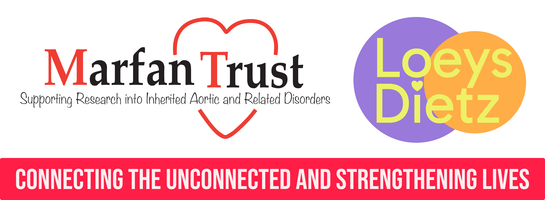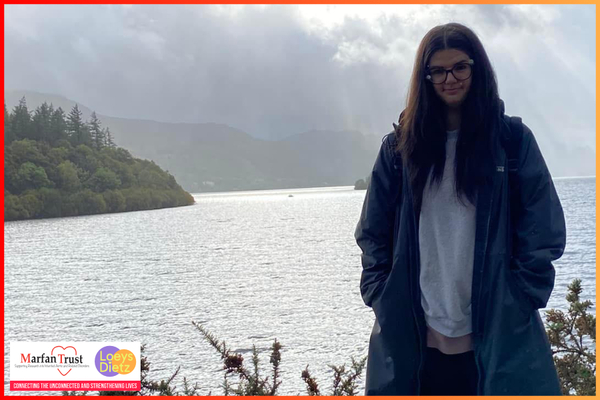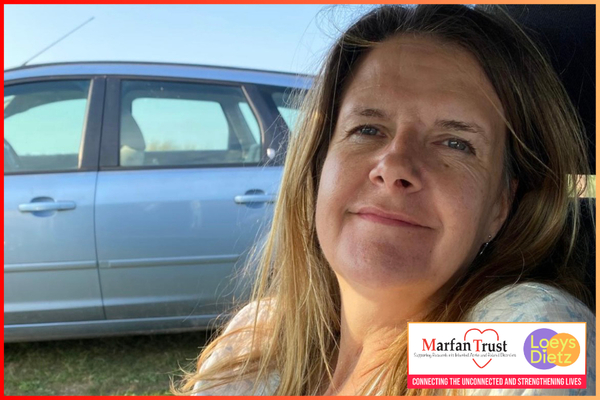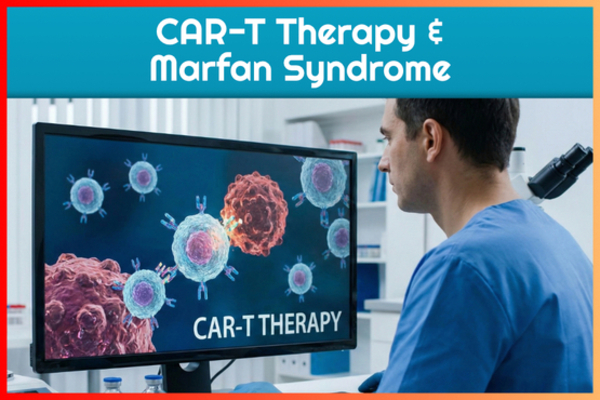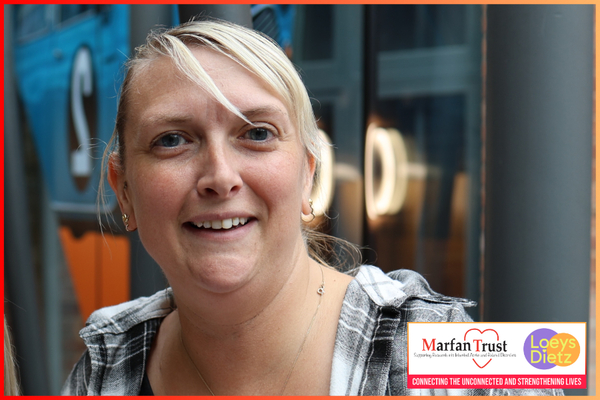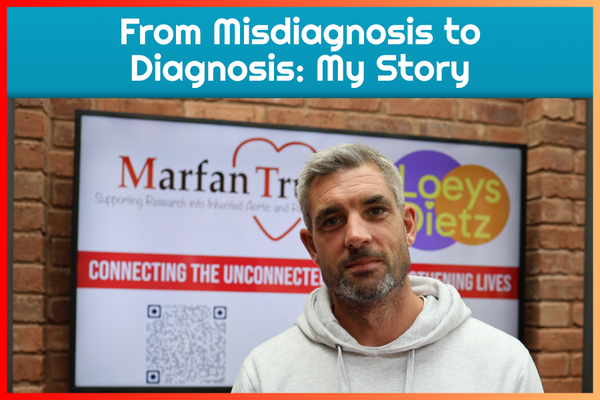A single symptom can spark a life-changing diagnosis. Ellie's scoliosis was the first clue that led to the discovery of Marfan syndrome in her family. Ellie also struggled with a chest wall problem and has since become an advocate and a founding member of the wonderful charity, Pectus Matters. Read her story!
Ellie will be speaking at our Information Day in Birmingham on Mental Health, Advocacy and Chest Wall Problems.
My name is Ellie. I’m 28 and live in Carlisle, in the very North of England.
Marfan Syndrome became a part of my life in 2006 when I was 10 years old and a GP recognised that I had a scoliosis at a routine appointment. Following two years of investigations and lots of hospital appointments, my mum, myself and my younger brother were diagnosed with Marfan Syndrome at ages 38, 12 and 10.
Considering that there are three of us within the same family, Marfan affects us all in completely different ways. My younger brother is 6ft 5 and presents with most of the visually recognisable hallmarks of Marfan with luckily very few of the health concerns, whereas my mum is 5ft 4, has an enlarged aorta and has had to undergo many eye surgeries due to Marfan-related issues. For me, the way Marfan has affected my health has mainly been musculoskeletal. I have four curvatures in my spine, three degenerate disks and have been living with chronic pain since my teens. I also had very severe pectus excavatum.
I always remember having had a dip in chest. As a child it caused me no issue at all and I didn’t even realise it wasn’t normal. As I went through puberty the dip in my chest worsened and became much more noticeable. It bothered me massively and had a big effect on my self-esteem, but I never had reason to suspect that it might be something that required medical attention; by my teens I was having regular appointments with a cardiologist and spinal surgeons where I was often topless, and no one had ever pointed out my chest or mentioned it even in passing.
I can remember very clearly the first time that I felt my chest collapse. I was 16 years old and I can remember being overcome with pain and feeling like the air was being pulled out of my lungs. There is no way to describe the feeling other than that it felt like my chest was falling in on itself. Over the next 6 years, these episodes became more and more frequent until I was at the point where my health was severely impacted. At 22 years old, living away from my family whilst studying my Masters degree, I was unable to walk the 10-minute journey to campus, or go food shopping at the supermarket just around the corner from my flat. Even just taking a flight of stairs would cause me to become so breathless that I became tachycardic. Just taking care of my basic health needs and my university studies left me completely exhausted, making it virtually impossible to spend time with friends or take part in the social activities that are so fundamental to the university experience. I felt incredibly isolated within my flat and deeply concerned that after my Masters was completed, I wasn’t going to be able to get a full-time job and move to another city like my classmates: I was going to have to return home to be looked after by my parents, abandoning my plans to start a career. Most importantly, I was crippled by shockingly low self-esteem and fear: fear that I didn’t have much time left to get my chest fixed until something very serious happened. CT scans showed that my heart had been pushed into the shape of a banana - having been forced into a new position by my encroaching chest – and lung function tests suggested that my lung capacity was around 40%.
It was at this point that I got in touch with Joel Dunning. I’d seen his name mentioned many times in the Pectus Support UK group on Facebook. Since 2013, I’d seen three separate cardiothoracic surgeons and been given wildly different opinions by them all. This had left me confused and anxious about ever having surgery on my chest. But by 2017, I was in such a state of desperation that I emailed Joel.
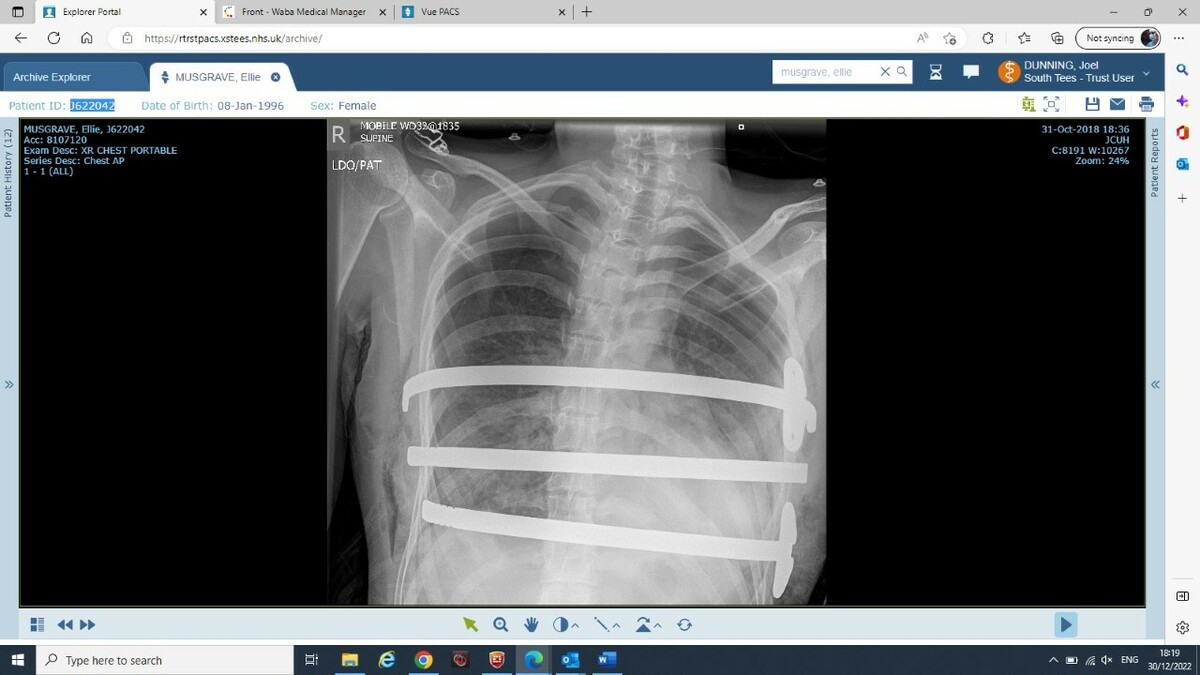
On October 31st 2018, I had the NUSS procedure at James Cook University Hospital in Middlesborough. After surgery I had three bars in my chest and received the devastating news from Joel Dunning that I had less than 2cm between my sternum and my spine: this measurement is usually over 20cm. During surgery Joel measured my Haller Index at 11.5, which I found very difficult to come to terms with considering that pectus excavatum is usually considered to be “severe” with a Haller Index of 3.5. I was reminded of that feeling that I’d had sitting alone in my flat, that time was running out to resolve this problem, and felt very lucky to have found Joel.
Recovery from the surgery was difficult, considering my issues with chronic pain and some unfortunate complications, but on the whole I saw results very quickly. I had to teach myself to breathe down into my stomach after years of taking tiny shallow breaths; many of my clothes didn’t fit me anymore now that the gap in my chest was gone. But most thrilling was my self-esteem was that for the first time ever I had boobs! Every day my ability to take deeper breaths and longer walks increased. After a few months, I joined a gym and started to swim. Gradually, I worked myself to a place where I was able to work part-time, and after a lot of hard work in the gym and intensive treatment for chronic pain I was able to work full-time.
Having the NUSS surgery was very transformative for me and took me from living at home being cared for by my parents whilst being declared unfit to work, to where I am now: living independently, pursuing a career in advocacy and being able to enjoy an active life not possible to me before.
It’s for this reason that I found it so devastating when not a year after my surgery, the NHS removed funding for pectus surgery, declaring deformities like mine “cosmetic only”. Me and my family were so shocked having seen the huge benefits surgery had had on my physical health. This overturn of policy was completely ridiculous and left me wondering what would have happened to me if I hadn’t have managed to have my surgery in time. What if my chest had continued collapsing? What if my sternum had touched my spine? Would I be paralysed? Would I be alive?
Over the years I’d written to my MP and signed petitions to get the issue back before parliament, but to no avail. I was still engaged with the community on Facebook and was happy to offer advice and comfort to worried patients and their families who weren’t able to access any treatment. Then in November of 2022, Joel mentioned a conference being held in London and a reinvigorated effort to encourage policy change. Within a few weeks, I’d been asked to speak and in February of 2023 I spoke at the Royal College of Surgeons alongside other patients, surgeons and experts from around the world. This was an incredibly proud and overwhelming moment that I will never forget, and a moment where I felt so thankful to Joel Dunning for everything he had given me.
At the conference I was introduced to a number of amazing and passionate people. Since then, we’ve been working together behind the scenes to lobby for changes to NHS England’s policy, advocate for patients, and advise on panels. Currently, there are six of us working together under the name Pectus Matters. We have become a registered charity, held our first webinar and enjoy advocating for best care and practice, supporting patients to access treatment, and increasing knowledge and awareness of pectus deformities.
